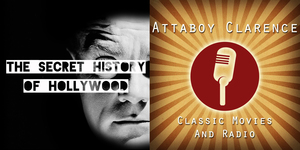If 'The Devil's Party' had been released before the superior 'Angels With Dirty Faces', it would have been seen as a cheap rip-off, but as the former was released in May of 1938, and the latter in November of the same year, then maybe we have the lesser film to credit for the existence of the greater?
Marty (Victor McLaglen) is a club owner and criminal boss, who took a bum steer in life when he took the rap for his gang during their youth, being sent to a reformatory for his trouble. The gang was the Death Avenue Cowboys, made up of Marty, brothers Joe and Mike (John Gallaudet and William Gargan) who have grown up to be cops, Jerry (Paul Kelly) who's become Father Jerry Donovan, and Helen (Beatrice Roberts), who's become the singer at Marty's club.
When Marty sends two inept henchmen to collect a debt, it begins a chain of events that involves murder and betrayal, set against the annual reunion of The Death Avenue Cowboys, where long-forgotten feelings are set to surface.
The similarities it shares with 'Angels With Dirty Faces' are startling: a gangster who heads back to his roots, a priest named Jerry, and yet where 'Angels' transcends its genre by becoming a story of an antihero, 'The Devil's Party' is content to be filler.
For a start, Victor McLaglen is horribly miscast here, his accent a thick New York one when he's a child, but the same old working-class English twang when he's the lumbering McLaglen. Where was the reformatory? Ipswich? He's never threatening enough to be the smart, criminal boss he's supposed to be portraying. You can imagine Cagney, or Paul Muni, or Edward G. Robinson raising this film to classic status by appearing in the role, but McLaglen simply isn't dangerous enough.
Paul Kelly, though, is a wonderful centre to the film, his Father Jerry being the calm, knowing, if a little stereotypical priest figure. The year after he really showed his mettle in 'The Roaring Twenties' as the sneering Nick Brown.
It's directed with a dreary style, that hardly moves from the same room, and is populated with dialogue that refuses to hold the attention. That's not to say that the film isn't enjoyable. It's fine, but it's also incredibly forgettable.
Sadly, the only remarkable feature about the movie, is that it may have somehow contributed to the making of a stone-cold classic.



